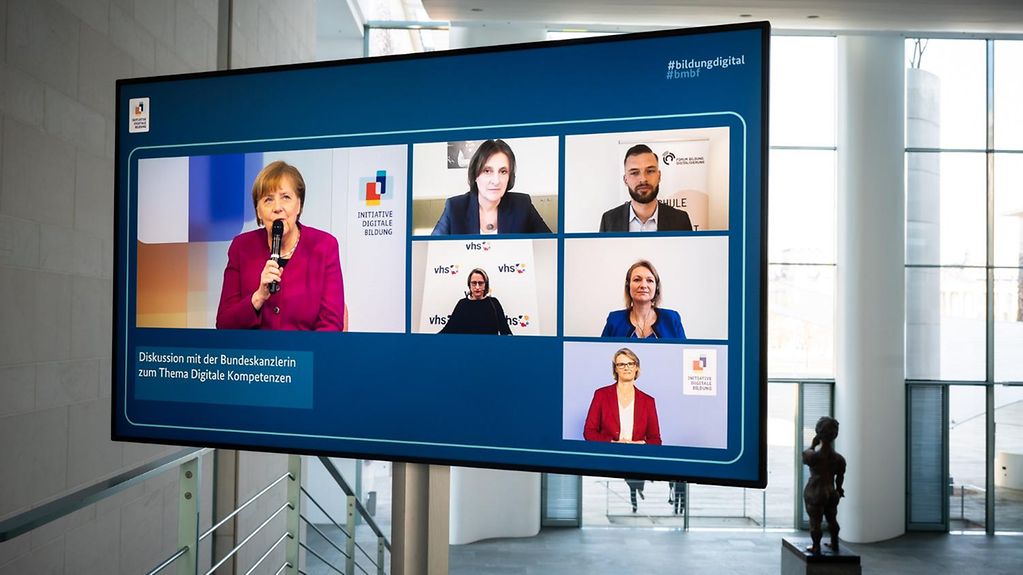Digital Education Initiative roll-out
Giving people of all ages whatever their previous experience the opportunity to improve their digital literacy. That was the idea behind the Digital Education Initiative which Federal Chancellor Angela Merkel and the Federal Education Minister, Anja Karliczek, have now launched. At an online kick-off event Angela Merkel made the point that everyone needed to have a sense of the importance of data.
4 min reading time

Federal Chancellor Angela Merkel and Federal Education Minister Anja Karliczek presented the Digital Education Initiative and the new Stadt-Land-DatenFluss app at a kick-off event
Photo: Bundesregierung/Steins
An app which teaches data literacy and a National Education Platform which is being established step by step are two concrete measures under the new Digital Education Initiative rolled out by Federal Chancellor Angela Merkel and Federal Education Minister Anja Karliczek. At an online kick-off event they presented the content of the Initiative and discussed digital teaching and learning with various experts.
Coronavirus crisis a driver of digital learning
The coronavirus crisis ran like a red thread through the entire online dialogue. Again and again those taking part emphasised just how much the lack of in-person teaching in schools and higher education institutions had drawn attention to the aspect of digital learning. However, right at the start the Federal Chancellor stressed that the new Digital Education Initiative was not only aimed at schools and higher education institutions but at “people of all ages”.
“Not rocket science”
It was important, said Merkel, that everyone acquired basic data literacy skills. As a comparison, the Federal Chancellor said that everyone knew what the dangers of working with electricity were. Digitalisation was “not rocket science” either. To better understand it, it was useful, for example, to consider the importance of algorithms.
Data literacy was necessary, because the world was getting ever more digital, the Federal Chancellor said. And the question then was whether people understood what was going on in that world. That was the question the Initiative wanted to address and provide help with, she said. Digital literacy was also “about entirely new opportunities that then called for entirely new pedagogical approaches,” Angela Merkel added.
Promise of equal opportunities
Federal Education Minister Anja Karliczek stressed that the coronavirus pandemic had also opened up “so many new avenues” in recent months. Digital literacy was as important as reading and writing, she said. “We all need to learn to get our bearings in the digital world.” Karliczek said she was confident that digital literacy was a way to fulfil the old promise of equality of opportunities. For example, digitalisation made it easier to give learners one-to-one support based on their level of ability and at an appropriate pace.
Federal Government already investing 6.5 billion euros
The Federal Education Minister drew attention to what the Federal Government had already done in regard to digital education. Under the Digital Pact for Schools it is providing a total of 6.5 billion euros in funding to the federal states, including 500 million euros for laptops to be loaned out to pupils and another 500 million euros for digital devices for teaching staff. A further 500 million euros was available to train and finance IT administrators. The Minister gave a further example of what the Federal Government was doing: a new School Cloud which is available to schools which are unable to access other digital offerings.
Confident data users
The President of the Standing Conference of Ministers of Education and Cultural Affairs, the Minister of Education of Brandenburg, Britta Ernst, also took part in the online dialogue event. She paid tribute to the “national race to catch up” in terms of digital learning and underscored how many teachers had updated their digital skills in recent months. Data literacy, Ernst said, was important even for elementary school pupils, because it was they who would need to be confident data users of the future.
New learning app
The aim of the new Stadt-Land-DatenFluss learning app is to teach people of all ages to be those confident data users. It was developed by the German Adult Education Association, with the Federal Chancellor as its patron. The app explains how new data-based technologies work and how to be aware of who data are being shared with and how they can be protected.
Angela Merkel said that younger people often found it easier to use digital technology. Older people, on the other hand, could help the young to categorise and prioritise the wide range of information which is available digitally.
The Minister of State for Digitalisation, Dorothee Bär, presented another app at the online event. The “Anton” app for schools has 100,000 exercises, more than 200 different types of activities, educational games and interactive explanations.
“Digital Learning Environment”
In future, access to high-quality offers is to be made easier for everyone wishing to engage in digital learning. The “Digital Learning Environment” will network the teaching, learning and development of digital skills across all educational areas and all educational phases.
National Education Platform
The key element is the new National Education Platform which is gradually being built up. Federal Education Minister Karliczek said that the aim was to provide teaching staff with good-quality digital teaching material and tailored pedagogical support. Employees will be able to find out about continuing training via various portals. And trainers and examiners will find good practice examples and useful digital tools.
Federal Chancellor Merkel said that one thing was particularly important about the new platform, namely data security. In addition, everyone needed to be able to recognise straight away that “the products available on it are of a certain quality, for instance”. Merkel said that a single point of access was also important so that “people didn’t have to search the whole of the internet for each new app”.